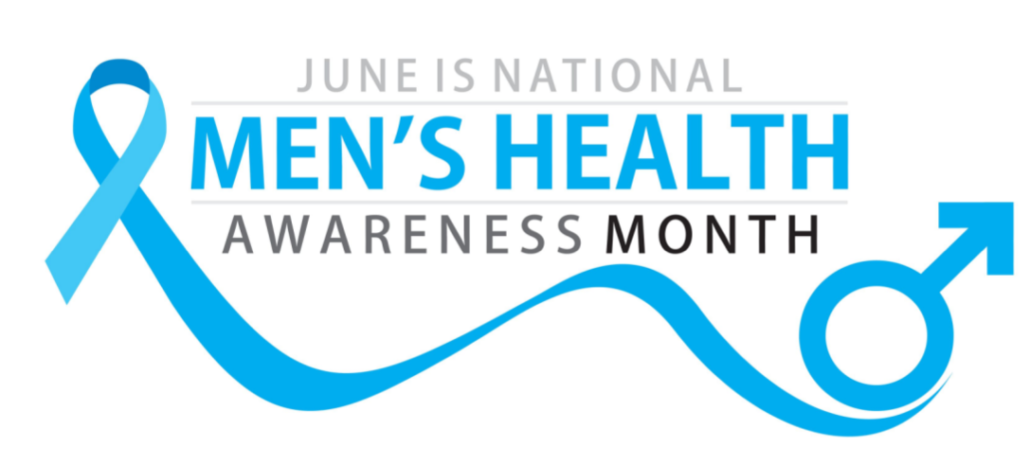On May 31, 1994, President Bill Clinton signed a bill establishing National Men’s Health Week.
Today we recognize the month of June as men’s health month.
According to menshealthmonth.org, the purpose of men’s health month is to heighten awareness of men’s health issues, while encouraging prevention, early detection and treatment of disease among men. As a result, thousands of awareness activities take place in June with those objectives in mind.
Despite advances in medical science, men continue to live an average of five years less than women. According to USAFacts, men born in 2006 can expect to live until 76.3 years of age, while women born the same year can expect to live until 81.4 years of age. The data also shows that black men have a shorter life expectancy than white men, at 71.3 years of age.
Some of the most common health issues among men are heart disease, cancer, and more recently COVID-19. According to the Centers for Disease Control (CDC), heart disease is the top killer when analyzing data from males of all age groups and ethnicities. Nearly one-quarter of deaths in males is due to heart disease.
While heart disease may be the most common cause of death in males, accidents occupy the top spot for those under 45 years of age, with suicide as the secondmost common cause of death in that age group. In males between the ages of 45 and 85, cancer is the leading cause of death.
According to the CDC -In 2018, only28 % of men aged 18 and over met the federal physical activity guidelines for aerobic and muscle-strengthening activity
– 40.5 % of men aged 20 and over are obese (2015-2018)
– 51.9 % of men aged 20 and over have hypertension high blood pressure (2015-2018)
The Gender Gap
Historically, men have been more hesitant than women to seek medical attention, nor are they as likely to have preventive screenings and checkups. This is a problem because early detection is the best way to improve effectiveness when it comes to treatment and management of a new medical situation. Delaying or avoiding a checkup or screening could lead to a treatable situation turning deadly.
While some screenings, such as HIV and hepatitis C, are recommended to have once, other screenings,
including certain cancers, should be performed regularly. Vaccines are also important to prevent infectious
diseases and should be administered at different intervals throughout adulthood. Common vaccines for an adult are pneumonia, influenza, COVID-19 and shingles.
Recommendations
• Regular physical exams – Men older than 50 should have a yearly physical exam, and men younger than 50 should have a physical exam every three to five years. Even if you’re feeling healthy, a regular checkup is a good way to validate your health or identify a problem in its early stages. This should include your mental well-being as well. • Blood pressure – High blood pressure can lead to other problems, such as heart disease or stroke, so have your blood pressure checked regularly, or check it yourself with a home blood pressure kit.
• Cholesterol – Like high blood pressure, high cholesterol may pose serious risks to your health, so have it checked a couple times a year, and more often if you have a family history of high cholesterol, smoke, eat a poor diet, are overweight, have diabetes, are physically inactive or older than 45.
• Diabetes – Diabetes is a serious medical condition. Since prediabetes symptoms can happen slowly and may not be noticeable, staying aware of your blood sugar level is important.
• Prostate cancer – It is generally accepted to begin screening at the age of 50 with a digital rectal exam. The best course of action is to discuss this with your primary physician or a urologist.
• Abdominal aortic aneurysm – For men between 65 and 75, the Mayo Clinic recommends a one-time abdominal aortic aneurysm screening ultrasound. Men over 60 with a family history of aortic aneurysm should consider regular screening.
• Colon cancer – By age 50, men should start getting a colonoscopy every 10 years, regardless of your overall health. As you age, your risk of developing polyps and bowel cancer increases. Getting routine colonoscopies helps your doctor find abnormalities early so they can be quickly treated. You should consider getting colonoscopies earlier if you have a family history of bowel cancer.
• Lung cancer – Screening will depend on whether you smoke, have a family history of lung cancer, have symptoms and other factors. Therefore, it is best to discuss screening with your family physician. If you experience shortness of breath, persistent cough, or any other symptoms, be sure to bring them to your doctor’s attention immediately— whether you routinely get screened for lung cancer or not. • Make healthy food choices, including eating plenty of fruits and vegetables. For a heart healthy diet, local clinical nutritionist Josephine Tutrani recommends the Mediterranean diet and regular cholesterol and blood pressure checks. For more information on specific medical diets, see: metalbolicwellnesssolutions.com
• Aim for 30 minutes of exercise every day – Regular exercise can strengthen your immunity, mitigate stress, and improve overall mental health
The key to prevention or management of serious medical conditions, including heart disease, is adopting and following a healthy lifestyle, including a sensible diet and regular amounts of exercise. Also, regular check-ups, recommended screenings and open communication with your physician are essential at all stages of life.







